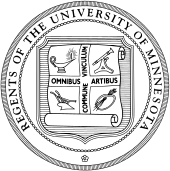
Back جامعة منيسوتا Arabic جامعة مينيسوتا ARZ Minnesota Universiteti Azerbaijani مینهسوتا بیلیمیوردو AZB Мінесоцкі ўніверсітэт Byelorussian মিনেসোটা বিশ্ববিদ্যালয় Bengali/Bangla Universitat de Minnesota Catalan University of Minnesota Danish University of Minnesota German Πανεπιστήμιο της Μινεσότα Greek
 | |
Other name | U of M; UMN |
|---|---|
| Motto | Commune vinculum omnibus artibus (Latin) |
Motto in English | "A common bond for all the arts" |
| Type | Public land-grant research university |
| Established | 1851[1] |
Parent institution | University of Minnesota system |
| Accreditation | HLC |
Academic affiliations | |
| Endowment | $5.501 billion (system-wide, 2023)[2] |
| Budget | $4.5 billion (2024)[3] |
| President | Rebecca Cunningham[4] |
| Provost | Rachel Croson |
Academic staff | 4,926 (fall 2024)[5] |
Total staff | 28,130 (fall 2024)[5] |
| Students | 56,666 (fall 2024)[6] |
| Undergraduates | 31,855 (fall 2024)[6] |
| Postgraduates | 11,255 (fall 2024)[6] |
| 5,658 (fall 2023)[7] | |
Other students | 9,670 (fall 2024)[6] |
| Location | , , United States 44°58′30″N 93°14′07″W / 44.97500°N 93.23528°W |
| Campus | Large city[8], 2,730 acres (1,100 ha) |
| Other campuses | Rochester[9] |
| Newspaper | Minnesota Daily |
| Colors | Maroon and gold[10] |
| Nickname | Golden Gophers |
Sporting affiliations | |
| Mascot | Goldy Gopher |
| Website | twin-cities |
 | |
The University of Minnesota Twin Cities[11][12] (historically known as University of Minnesota) is a public land-grant research university in the Twin Cities of Minneapolis and Saint Paul, Minnesota, United States. The Twin Cities campus comprises locations in Minneapolis and Falcon Heights, a suburb of St. Paul, approximately 3 mi (4.8 km) apart.[13]
The Twin Cities campus is the oldest and largest in the University of Minnesota system and has the ninth-largest (as of the 2022–2023 academic year) main campus student body in the United States, with 54,890 students at the start of the 2023–24 academic year.[14] It is the flagship institution of the University of Minnesota System and is organized into 19 colleges, schools, and other major academic units.
The Minnesota Territorial Legislature drafted a charter for the University of Minnesota as a territorial university in 1851, seven years before Minnesota became a state. The university is currently classified among "R1: Doctoral Universities – Very high research activity".[15] It is a member of the Association of American Universities. The National Science Foundation ranked University of Minnesota 22nd among American universities for research and development expenditures in 2022 with $1.202 billion.[16][17] The University of Minnesota is considered a Public Ivy university.[18]
The Minnesota Golden Gophers compete in 21 intercollegiate sports in the NCAA Division I Big Ten Conference and have won 29 national championships.[19][20] As of March 2024, Minnesota's current and former students have won a total of 90 Olympic medals. There are 25 Nobel laureates associated with the university. [21][22]
- ^ "Board of Regents Policy" (PDF). University of Minnesota. Archived (PDF) from the original on May 8, 2015. Retrieved August 31, 2015.
- ^ "U.S. and Canadian 2023 NCSE Participating Institutions Listed by Fiscal Year 2023 Endowment Market Value, Change in Market Value from FY22 to FY23, and FY23 Endowment Market Values Per Full-time Equivalent Student" (Excel). National Association of College and University Business Officers (NACUBO). 2023. Retrieved January 4, 2025.
- ^ For Minnesota State Fiscal Year 2024 "University Budget and University Finance". University of Minnesota. Archived from the original on March 10, 2024. Retrieved March 26, 2024.
- ^ "Office of the President". president.umn.edu. Archived from the original on July 1, 2024. Retrieved July 1, 2024.
- ^ a b "University of Minnesota: Faculty and Staff Headcounts". University of Minnesota Office of Institutional Data and Research. Archived from the original on March 13, 2024. Retrieved March 26, 2024.
- ^ a b c d "Official Enrollment Statistics". University of Minnesota. Archived from the original on January 16, 2024. Retrieved March 26, 2024.
- ^ "All University of Minnesota Graduate Enrollment". University of Minnesota. Retrieved January 4, 2025.
- ^ "College Navigator – University of Minnesota-Twin Cities". nces.ed.gov. Archived from the original on November 7, 2021. Retrieved November 7, 2021.
- ^ "HLC - University of Minnesota-Twin Cities - Branch Campuses".
- ^ "Our Brand: How to Convey It". University of Minnesota. Archived from the original on February 13, 2023. Retrieved March 3, 2023.
- ^ "UNIVERSITY OF MINNESOTA SYSTEM IDENTITY" (PDF). The University of Minnesota System. Retrieved September 27, 2024.
- ^ "About Us". University of Minnesota Twin Cities. Retrieved September 27, 2024.
- ^ "About Us". University of Minnesota Twin Cities. Archived from the original on October 11, 1999. Retrieved August 3, 2015.
- ^ "Official Enrollment Statistics". Office of Institutional Research. Archived from the original on January 19, 2024. Retrieved March 26, 2024.
- ^ "Carnegie Classifications Standard Listings". The Carnegie Classification of Institutions of Higher Education. Archived from the original on December 16, 2021. Retrieved April 15, 2016.
- ^ "UMN Research Statistics | RIO". research.umn.edu. Retrieved March 26, 2024.
- ^ Zalaznick, Matt (January 6, 2023). "Billion-dollar business: These are higher ed's top 30 R&D performers". University Business. Retrieved December 28, 2023.
- ^ Greene, Howard R.; Greene, Matthew W. (2001). The public ivies: America's flagship public universities (1st ed.). New York: Cliff Street Books. ISBN 978-0060934590.
- ^ "University of Minnesota Athletics - Official Athletics Website". University of Minnesota Athletics. Retrieved March 26, 2024.
- ^ "Minnesota Championships". University of Minnesota Athletics. Retrieved March 26, 2024.
- ^ "Golden Gophers in the Olympics". University of Minnesota Athletics. Archived from the original on September 27, 2023. Retrieved March 26, 2024.
- ^ https://scholarswalk.umn.edu/national-and-international-awards/nobel-prize#:~:text=Twenty-five%20individuals%20who%20have%20been%20faculty%20or%20students,site%20for%20details%20and%20history%20about%20this%20award%29.